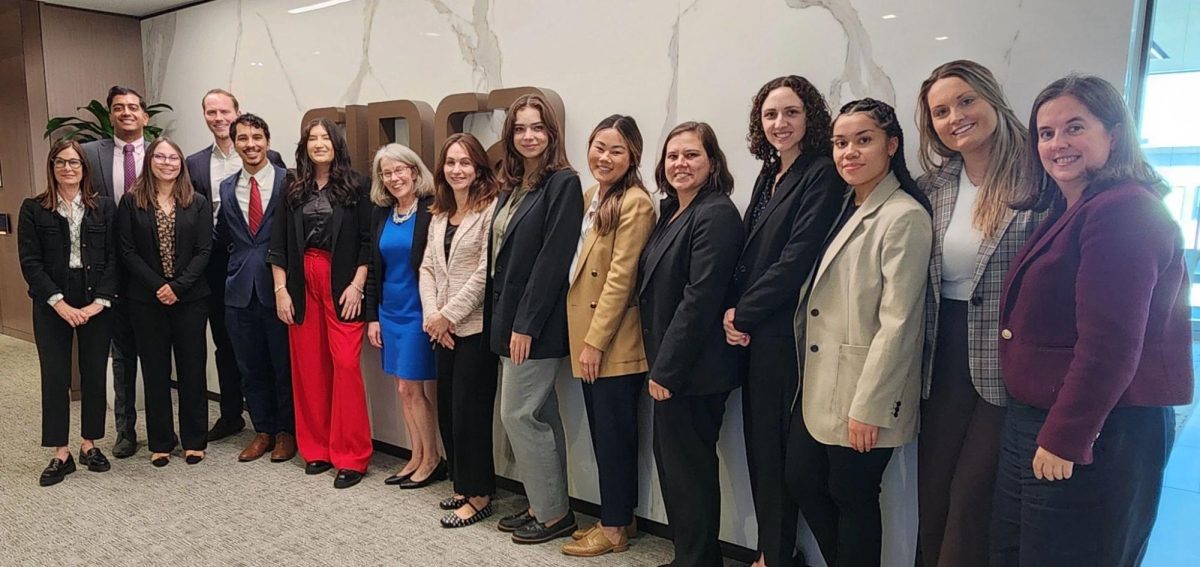Recently, seven students from the Law School’s in-house Securities Arbitration Clinic traveled to the nation’s capital to learn how administrative agencies and self-regulatory organizations work to protect, educate, and advocate for investors.
For 20 years, operating out of a second-floor suite at St. John’s Law, the one-semester Securities Arbitration Clinic has offered students an unrivaled opportunity to help represent underserved investors in securities arbitration claims before the Financial Industry Regulatory Authority (FINRA). Supervised by Clinic Directors Christine Lazaro and Elissa Germaine, students handle all phases of their clients’ cases and gain valuable lawyering skills, including client interviewing, counseling, negotiation, and advocacy, as well as substantive legal knowledge of securities laws and the securities arbitration process.
In addition to representing clients, clinic students work on policy and rulemaking initiatives by responding to requests for public comment from the U.S. Securities and Exchange Commission and FINRA. They also make investor education presentations to fellow students and in the surrounding community. “As they represent clients and engage in other forms of advocacy, our students learn about the vast ecosystem of private and public efforts to protect vulnerable investors in the United States,” Professor Lazaro says. “Our Washington, D.C. trips introduce them to major participants within that ecosystem.”
For their latest D.C. trip, Professors Germaine and Lazaro teamed with the University of Miami School of Law’s Investor Rights Clinic to create a unique itinerary for the students. “As it usually does, our time in D.C. included a visit with FINRA,” says Professor Germaine. “But this time, to add a focus on government affairs and policy advocacy, we arranged for the students to meet with representatives from the Certified Financial Planner Board of Standards (CFP Board), a non-profit organization that sets and enforces the requirements for the Certified Financial Planner (CFP) certification, from Better Markets, a nonprofit working to build a more secure financial system for all Americans, and from the American Association of Retired Persons (AARP).”
Along with FINRA, the CFP Board, Better Markets, and AARP are all important voices in the investor and policy advocacy space, Professor Lazaro shares. “I’ve worked closely with all three organizations in connection with fiduciary rulemaking, and thought it would be interesting for our students to see how attorneys use their skills to advocate in settings other than direct representation.” The Clinic students agree that hearing directly from leaders in the field was a formative experience that complemented their work in the Clinic.
“Law school has been such a rewarding experience, and this trip has been my favorite part so far,” says Katie Loy ‘25. “Just a few years ago, I worked as a Registered Representative licensed by FINRA. On the Clinic trip, I had the opportunity to meet with, and learn from, FINRA attorneys. Having the chance to use that experience and knowledge to help underrepresented investors through the Clinic is one of the many reasons I’m grateful I decided to attend law school.”
For Loy’s classmate, Aria Lugo ‘25, meeting with CFP Board representatives was especially impactful. “Our visit to the CFP Board was a true highlight of my time in the Clinic,” she says. “The talks given by the professionals were highly informative, provided valuable insights into the self-regulatory landscape of securities, and allowed me to gain a deeper understanding of the regulatory requirements and ethical considerations that financial planners must adhere to. Hearing so many accomplished attorneys speak about their career paths made me feel optimistic about potential career paths I can embark on as I begin my legal career next fall.”
Seeing how the students benefited from their time in D.C. this semester, Professors Lazaro and Germaine look forward to future trips. “We were at the CFP Board for about four hours and at FINRA for about three hours. In that way, the trip offers students a truly immersive experience outside the classroom that helps them envision how they can use their St. John’s Law degree to help underserved investors and others whose voices often go unheard. We’re very proud to foster experiential learning that helps our students thrive as lawyers who serve the greater good.”

